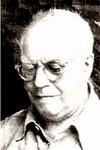Biography

Conrad Potter Aiken was born in Savannah, Georgia, on August 5, 1889. When he was a small boy, his father killed his mother and committed suicide himself, a tragedy that had a profound impact on Aiken's development. He was raised by a great-great-aunt in Massachusetts and graduated from Harvard in 1912, the same period as T. S. Eliot and E. E. Cummings. During this time, he was also a contributing editor to Dial magazine, where he befriended Ezra Pound. His first collection of poetry, Earth Triumphant, was published in 1914, establishing his reputation as a poet. He avoided military service during World War I by claiming that, as a poet, he was part of an "essential industry". During the 1920s and 1930s Aiken travelled extensively between England and North America and married three times, once to Jessie McDonald, then to Clarissa M. Lorenz and later the artist Mary Hoover. (Joan Aiken, the children's book writer, is Aiken and McDonald's daughter.)
Most of Aiken's poetry reflects an intense interest in psychoanalysis and the development of identity. Of the many influences Aiken acknowledged, the writings of Freud, William James, Edgar Allan Poe, and the French Symbolists are most evident in his work. The forms and sounds of music pervade all of Aiken's highly introspective poetry, collected in The Jig of Forslin (1916); The Charnel Rose (1918); Selected Poems (1929), which won the Pulitzer Prize in 1930; Brownstone Eclogues (1942); The Kid (1947); Collected Poems (1953), which won the National Book Award; and Collected Poems 1916-1970 (1970). His work in Collected Novels (1964), including Blue Voyage (1927), shows Aiken to be a master of interior monologue. His novels had a profound influence on the works of many young writers of the day, including his protégé, Malcolm Lowry.
Aiken was Poetry Consultant to the Library of Congress (now the U.S. Poet Laureate) from 1950-52. His other honors included the Bollingen Prize, the Gold Medal in Poetry from the American Academy of Arts and Letters, and a National Medal for Literature. Aiken's critical essays are compiled in A Reviewer's ABC (1958); his Collected Short Stories appeared in 1960. As editor of Emily Dickinson's Selected Poems (1924), Aiken was largely responsible for establishing her posthumous literary reputation. The Selected Letters of Conrad Aiken (1978) contains correspondence with such literary colleagues as Wallace Stevens, Harriet Monroe, and Edmund Wilson, and his autobiographical book Ushant (1952) affords much insight into other literary figures he knew, mingling personal references with mention of his associates. Conrad Aiken died in Savannah in 1973.
A Letter from Lí Po and Other Poems (1955)
A Seizure of Limericks (1964)
And in the Hanging Garden (1933)
And in the Human Heart (1940)
Brownstone Eclogues (1942)
Collected Poems (1953)
Collected Poems (1970)
Earth Triumphant and Other Tales in Verse (1914)
Gehenna (1930)
John Deth, A Metaphysical Legacy, and Other Poems (1930)
Landscape West of Eden (1934)
Nocturne of Remembered Spring and Other Poems (1917)
Prelude (1929)
Preludes for Memnon (1931)
Priapus and the Pool (1922)
Punch: The Immortal Liar (1921)
Selected Poems (1929)
Selected Poems (1961)
Sheepfold Hill: Fifteen Poems (1958)
Skylight One: Fifteen Poems (1950)
The Charnal Rose, Senlin, and Other Poems (1918)
The Coming Forth by Day of Osiris Jones (1931)
The Divine Pilgrim (1949)
The Fluteplayer (1956)
The House of Dust: A Symphony (1920)
The Jig of Forslin: A Symphony (1916)
The Kid (1947)
The Morning Song of Lord Zero (1963)
The Pilgrimage of Festus (1923)
The Soldier: A Poem (1944)
Time in the Rock: Preludes to Definition (1936)
Turns and Moves and Other Tales in Verse (1916)
Wake II (1952)



